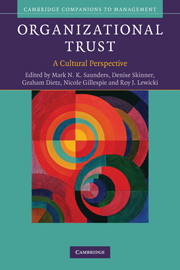Book contents
- Frontmatter
- Contents
- List of figures
- List of tables
- Note on editors
- Note on contributors
- Foreword
- Editors' acknowledgements
- Part I The conceptual challenge of researching trust across different ‘cultural spheres’
- Part II Trust across different ‘cultural spheres’: inter-organizational studies
- Part III Trust across different ‘cultural spheres’: intra-organizational studies
- 11 The role of trust in international cooperation in crisis areas: a comparison of German and US-American NGO partnership strategies
- 12 Antecedents of supervisor trust in collectivist cultures: evidence from Turkey and China
- 13 Trust in turbulent times: organizational change and the consequences for intra-organizational trust
- 14 The implications of language boundaries on the development of trust in international management teams
- 15 The dynamics of trust across cultures in family firms
- Part IV Conclusions and ways forward
- Index
- References
11 - The role of trust in international cooperation in crisis areas: a comparison of German and US-American NGO partnership strategies
Published online by Cambridge University Press: 05 June 2012
- Frontmatter
- Contents
- List of figures
- List of tables
- Note on editors
- Note on contributors
- Foreword
- Editors' acknowledgements
- Part I The conceptual challenge of researching trust across different ‘cultural spheres’
- Part II Trust across different ‘cultural spheres’: inter-organizational studies
- Part III Trust across different ‘cultural spheres’: intra-organizational studies
- 11 The role of trust in international cooperation in crisis areas: a comparison of German and US-American NGO partnership strategies
- 12 Antecedents of supervisor trust in collectivist cultures: evidence from Turkey and China
- 13 Trust in turbulent times: organizational change and the consequences for intra-organizational trust
- 14 The implications of language boundaries on the development of trust in international management teams
- 15 The dynamics of trust across cultures in family firms
- Part IV Conclusions and ways forward
- Index
- References
Summary
Summary
International and intra-national crises often require international cooperation for resolution. Cooperation is increasingly a function of international partnerships among various levels of societal, non-governmental organizations (NGOs). The present study examines partnership strategies within and between international development and humanitarian agencies based in Germany and the United States. Using in-depth interviews and content analytic methods, the study looks at the trust-development criteria and processes across multiple levels of international organizational cooperation. Culture-specific preferences in trust-building processes are identified which can enable actors to build and maintain trust within and between international development and humanitarian agencies, but can also generate potential barriers. The study extends standard trust-building models to include affective and progressive trust formation processes. Findings on cultural differences in partnership-building strategies and trust development are presented as well as recommendations for improving best practice in strategic NGO alliances.
Introduction
The last two decades have produced some of the most significant humanitarian crises in history. The natural disaster and conflict centres include Haiti, Southeast Asia, Pakistan, Sudan, Rwanda, the Balkans, West Africa, Afghanistan, Columbia, Iraq, Sri Lanka, East Timor and the United States. As crises tax the capacity of the United Nations and other international governmental organizations (IGOs), non-governmental organizations (NGOs) are asked to play an increasingly significant role in disaster relief, rehabilitation and development (Helton, 2002). Unfortunately, the response of the international community in providing food, shelter and medical care in the midst of these crises is often disjointed and inefficient (Bebbington and Farrington, 1993; Loescher and Helton, 2002) In part, the explanation for this less than optimal response lies in the complexity of the task to which these organizations apply themselves.
- Type
- Chapter
- Information
- Organizational TrustA Cultural Perspective, pp. 281 - 310Publisher: Cambridge University PressPrint publication year: 2010
References
- 4
- Cited by

